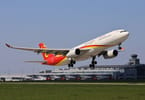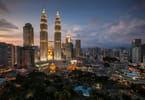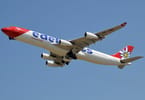As the mainstream media cranks up its coverage of the Ebola virus “outbreak,” I can’t help but recognize some familiar elements at play. We have been here before a few times. Most notably, the Severe Acute Respiratory Syndrome (SARS) 2003 Pandemonium. The overblown massive global “news coverage” which instilled fear among the masses, who were rightfully in a heightened state of alertness due to fears of contracting the virus.
All things considered, I have decided to share the below article:
My trip to Hong Kong at the height of the 2003 SARS pandemonium was undoubtedly taken under very serious pretenses. Much to the begging of my family to not go on the trip, with my mother going as far as contacting a cousin who was living in Hong Kong at the time, I went on the trip. The fear of contracting the SARS virus was so prevalent that commercial airplanes were literally flying empty. This subsequently led to many carriers halting service to affected areas. Cathay Pacific, for very obvious reasons, hung on and ultimately provided me the opportunity to go to Hong Kong myself. I felt compelled to go.
Surely enough, my flight from Los Angeles to Hong Kong in 2003, was predictably empty. It felt odd knowing that I was heading towards the very destination where most people did not want to go. After I checked into my hotel, I immediately headed to the city to commence my investigation. On the train ride to Kowloon, I saw some people wearing face masks, but the majority were not. I was a bit confused, because this is consistent with what I had seen earlier at the airport, but not with what I had seen with the mainstream media’s coverage of Hong Kong’s SARS situation in the previous months. I had expected to see hordes of people wearing face masks to protect themselves from getting infected with SARS. That expectation was fueled by images from news articles and television coverage of the “situation in Hong Kong.”
I walked around in Kowloon for quite some time, hoping to find something to write about – but, nothing. The streets of Kowloon on that particular day in 2003 seemed like an ordinary day. There was no chaos to report. The sense of panic in the streets or fear was simply not at play. It looked like everyone was going about their day in a business-as-usual kind of way. The more I walked, the more I felt comfortable. Before long, I was walking around as if I was actually headed somewhere specific. Whatever apprehension I had prior to my trip because of what had been reported in the mainstream media, had been quelled. What was all the fuss about? Why were people so afraid to come to Hong Kong?
I came to the realization that what’s being flashed on TV screens across the world are isolated incidents where situations showing an extreme circumstance is captured either on film or photo then used as the main focal point of a news report about the SARS situation in Hong Kong. For example, I saw a bunch of people at the airport wearing face masks. By happenstance, they were seated close to one another, but they were clearly just minding their own business. Some were reading a book, while others were just sitting down. As a reporter, I would have taken a picture of it, if this was a prevalent scene at the airport. It wasn’t. The simple truth is that most people were not wearing face masks. It would have been an act of exploitation to take a photo of that cluster of people to use in a news report.
Clearly, that is what had been happening with the global media’s treatment of SARS. Opportunistic journalists trying to beef-up coverage of a situation that was well under control by the Hong Kong authorities then passed on whatever information they’ve scoured to their overzealous editors, who then further sensationalized these materials and instilled fear among the masses. Yes, there were people dying from SARS, but as far as Hong Kong being an affected area, there was no reason to declare pandemonium.
I had wandered around the city so long that I eventually became hungry. Hong Kong is predominately a Mandarin-speaking destination and as big of a cosmopolitan that it is, communicating in a language other than Mandarin can be a challenge. I began to look for a restaurant that had an English menu. I can’t remember how many times I walked into a restaurant and said, “English menu?” only to be turned away. I was adamant about seeing a menu in English, because I have had experiences in China where I ordered a dish that I did not end up eating.
Ultimately, that became the task – to look for a place to eat. I was no longer worried about getting infected by some virus; I needed to eat. After numerous failed attempts at finding a restaurant that had someone I could communicate with, I found a restaurant where I could communicate through body language. As I walked in, a waitress greeted me with a smile. “English menu?” I said. She shook her head. I made a hand gesture showing I want to eat, which she responded to by nodding. After she sat me down, she proceeded to show me what was in the menu. With one gesture from her, I managed to order dinner. She raised both of her hands towards her chest then proceeded to flap them like wings. I figured she either meant chicken or duck, so I nodded. A few minutes later, she came back to my table and served me a duck dish. It was delicious.
Editor’s Note: This story is an excerpt from the upcoming book by Nelson Alcantara titled, “No Permanent Address: The Adventures and Misadventures of… Modern Nomad.” Please visit www.111finiteloop.net for more info.
ZVOKUBVA MUNYAYA INO:
- Much to the begging of my family to not go on the trip, with my mother going as far as contacting a cousin who was living in Hong Kong at the time, I went on the trip.
- I came to the realization that what's being flashed on TV screens across the world are isolated incidents where situations showing an extreme circumstance is captured either on film or photo then used as the main focal point of a news report about the SARS situation in Hong Kong.
- I was a bit confused, because this is consistent with what I had seen earlier at the airport, but not with what I had seen with the mainstream media's coverage of Hong Kong's SARS situation in the previous months.






















